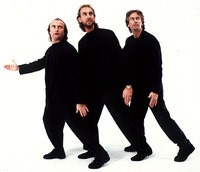The key change is an essential device in the pop canon. Play song, move chords and melody up a half step or so, continue in new key until otherwise noted. It's simple, really, and often effective, which is why it has been employed to the point of abuse. Here are the six best key changes in pop music.
6. Genesis - Invisible Touch (2:42) First things first, Invisible Touch is not the big shark jump in the Genesis catalog. The title track is not Phil Collins' pop takeover of the prog rock band. There is plenty of musical ambition in the song. That synthesizer interlude between choruses destroys. And something about the upward shift on the repeated final hook comes off like something Yes would do. Every prog band went through an identity crisis in the 1980s, and "Invisible Touch" may have alienated some diehards, but it's a hell of a lot better than, say, "Owner Of A Lonely Heart."
5. Beach Boys - Wouldn't It Be Nice? (0:07) Functionally, the key change adds drama and suspense to a song. Henceforth, they usually appear towards the end. The first notable event in The Beach Boys' "Wouldn't It Be Nice?" is a key change - a whopping seven seconds into the track. It sets up the notion that you're about to listen to something important. Which, if "Wouldn't It Be Nice?" comes on because you just put on Pet Sounds, significance abounds.
4. Stevie Wonder - I Just Called To Say I Love You (3:00 and throughout) I feel a societal pressure to hate on "I Just Called To Say I Love You," but I can't. It is a hokey love song by a respectable artist. "Silly Love Songs" by Sir Paul without the self-awareness. Stevie manages to underplay the "no, you hang up" sentiment, just like he underplays the key changes that occur almost ever chorus. No big deal, just calling to say he loves you, just moving the chords up a bit. Just repeating most of the song with a vocoder. Ain't no thing.






